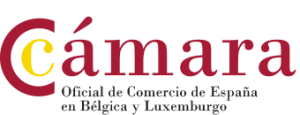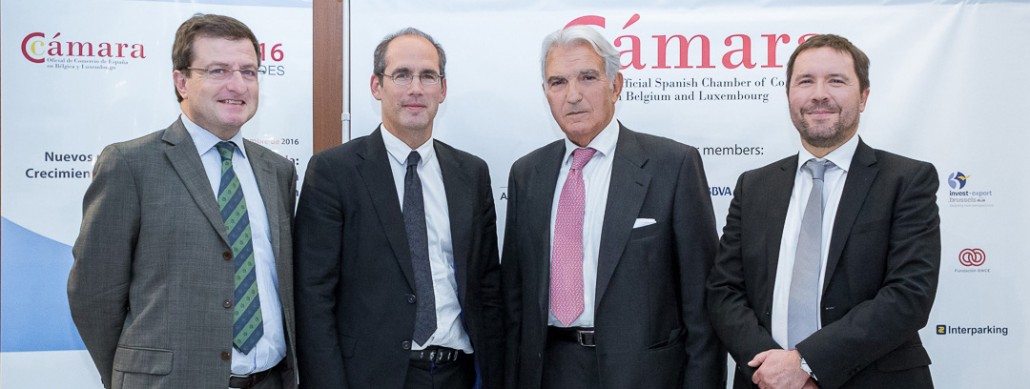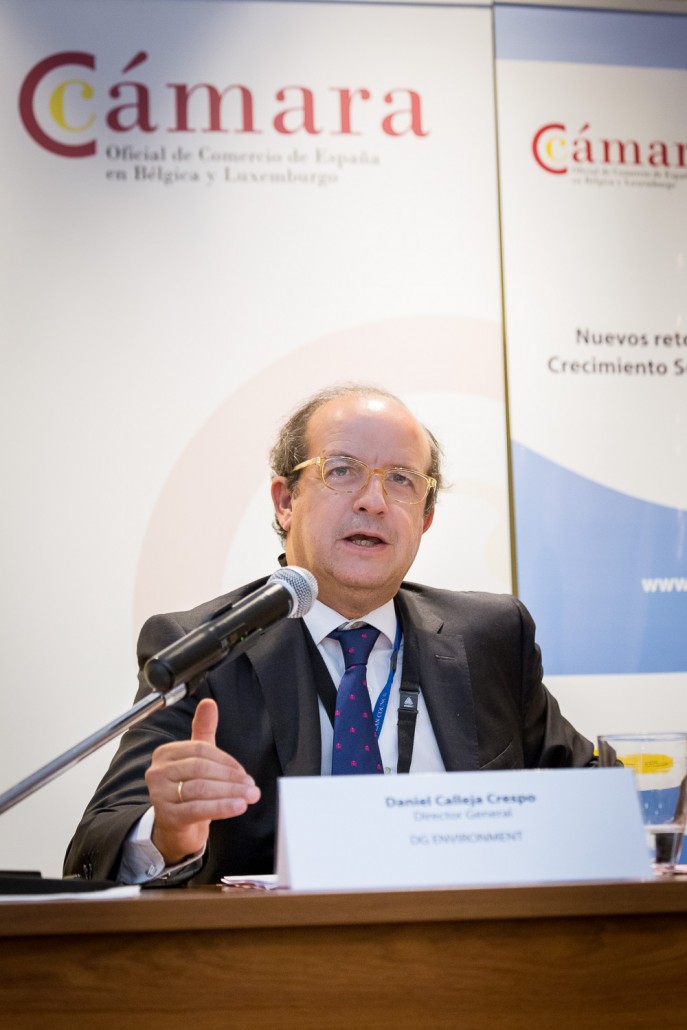New challenges for the Spanish economy: Sustainable Growth, Energy Union and Immigration
The Official Spanish Chamber of Commerce in Belgium and Luxembourg, within the framework of the initiative “Hablamos de Europa”, promoted by the Secretary of State for the European Union, organized last September 28th the event “New challenges for the Spanish economy: Sustained Growth, Energy Union and Immigration”. The event was held at the Permanent Representation of Spain to the European Union.
The aim of the event is to encourage the dialogue between the Spanish business and civil society based in Brussels around three priorities of the new European cycle. To that end, high-level representatives of the European Commission participated in the event: Alejandro Ulzurrun (DG Energy. Head of Unit – Communication and Inter-institutional Relations), Daniel Calleja (DG Environment – Director General) and Francisco Gaztelu (DG Home. Head of Unit – Migration and Security Funds).
The Spanish ambassador to the EU institutions, Mr. Alfonso Dastis Quecedo, delivered welcoming remarks and said that he was pleased to host the event in the Permanent Representation of Spain to the EU premises.
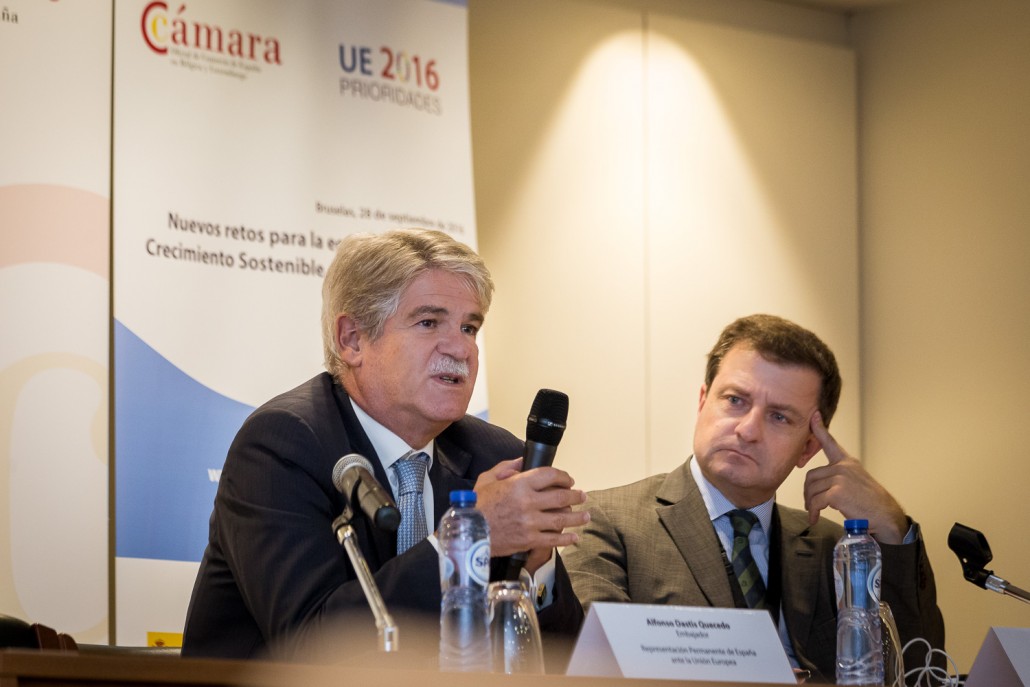
The Spanish ambassador to the EU institutions, Mr. Alfonso Dastis Quevedo, with the event moderator, Ignasi Guardans – Photography by: Daniel Osorio
After that, Alejandro Ulzurrun started the first presentation, which focused on the Energy Union, an EU priority which is not only a particular energy policy but it is relevant to all the economy sectors. “Only working together we can improve the European Union economy”, stated the speaker.
Ulzurrun went over the projects related to this area in which the EU has been working since the new cycle started and he highlighted the Madrid Declaration, through which Spain, France and Portugal, with the support of the President of the European Commission, Jean Claude Juncker, committed themselves to boost energy interconnections. This politic will allowed to launch the Midcat gas pipeline between Spain and France.
The speaker also put a stress on two challenges of the European Commission: the review of the Directive on energy efficiency and a new energy market design. “Our goal is to save at least 27% of energy before 2030”, highlighted Ulzurrun. Thus, it is necessary to take a lead in reducing energy consumption in homes.
In order to integrate renewable energies into the European Union and make them go from where they can be produced easily to other locations where they face more difficulties, interconnections must exist. Moreover, the contracts established by the countries to buy energy among them must be long-term.
The Director-General of the DG Environment, Daniel Calleja, is also aware of the need of a well-functioning integrated market. He started his intervention underlining that, in order to address the economic, political, immigration and security crisis, the EU has to reaffirm the unity and focus on a number of key fields to consolidate the EU project. One of those is the sustainable growth and environment policy, since, in Calleja’s words, “95% of the Europeans and 96% of the Spaniards think that this is the one which has brought the highest value added to their lives and Europe should keep strengthen it”. In spite of the successes achieved so far, such us the Treaty of Paris, the Director General of Environment recognized that there is still a great deal to do on the question. One of them, he mentioned, is the encouragement of the circular economy: “We have to change the economic model because the linear one, based on production, consumption and waste, is not viable anymore. If we follow this way, we will need two planets by 2030”.
The circular model, on the other hand, aims to maximize resource and minimize waste. In addition, it offers a triple benefit: economic, social and environmental. First of all, if the companies use fewer resources to produce, they will have less costs, they will be more competitive and they will obtain more benefits. To this end, Calleja highlighted that, according to the Foundation Ellen MacArthur’s data, Europe could save 600.000 million euros if companies were more resource-efficient. “The circular economy is innovation and reuse”, told the speaker in order to highlight the social benefits. Another one is the job creation. Finally, Calleja emphasized that a more efficient use of the resources could mean an annual reduction of between 2 and 4% on greenhouse gases emissions.
In order to work towards the establishment of the circular economy, the Commission has adopted an ambitious Circular Economy Package, which includes 54 measures, such us the eco-design – to design the products thinking in its later recycling- and the fight against the planned obsolescence. Calleja also emphasized the need for informing and educating consumers: “We are reviewing the European environmental label to guarantee that the green products, which have great interest currently, are really ecological and to avoid consumer frauds”.
During question time, Ángel Rebollo, from the communication consultancy Atrevia, maintained that the society should be more aware about the importance of sustainability. This opinion was also shared by Calleja in his answer; he recognized that the Commission has to improve the communication with the society, the consumers and the companies in order to encourage the awareness.
“Three out of four crises, named by Calleja at the beginning of his intervention -the migration one, the crisis generated from the Brexit and the one caused by the emergence of the extreme right wing- are related with the society’s perception of the immigration”, affirmed the round table moderator and partner of the K&L Gates law firm, Ignasi Guardans, who introduced with those words the last conference of this cycle. Francisco Gaztelu, DG Home. Head of Unit – Migration and Security Funds, explained that in order to address the problem with the refugees and to guarantee their safety the European Union tries to guarantee their right to the protection uniformly in every Member State. Furthermore, Gaztelu continued, the Commission has also worked in helping to those EU countries, which received more immigrants, through the reform of the Dublin Declaration for the resettlement of the refugees. “We have cooperated with third countries, such as Libya, Jordan, Lebanon or Turkey, in order to guarantee that those immigrants who remained along the road can be protected and to establish legal immigration channels”, the rapporteur added.
Gaztelu also mentioned other type of immigrants that “the EU needs for its economy progress”. Those are the high qualified. “Three-quarters of the jobs created in the EU nowadays are from the Emerging Science and Innovation sector, Health and Engineering, and we need, therefore, more qualified people”, he explained. However, 78% of immigrants with this profile looks for a non-European country to work in. To reverse this percentage, “we must make the European Union a more attractive location”, with a more open legislative, political and social framework, to offer employment opportunities to those who are willing to come.
The colloquium concluded with the intervention of the President of the Chamber, Juan Rodríguez-Villa Matons, who thanked the rapporteurs and the audience their participations. He also welcomed the willingness of the Ambassador Alfonso Dastis and the Spanish Permanent Representation for holding the event at their premises. After these words, the participants enjoyed a cocktail offered by the restaurant Hispania, which will open its doors this autumn in Brussels.
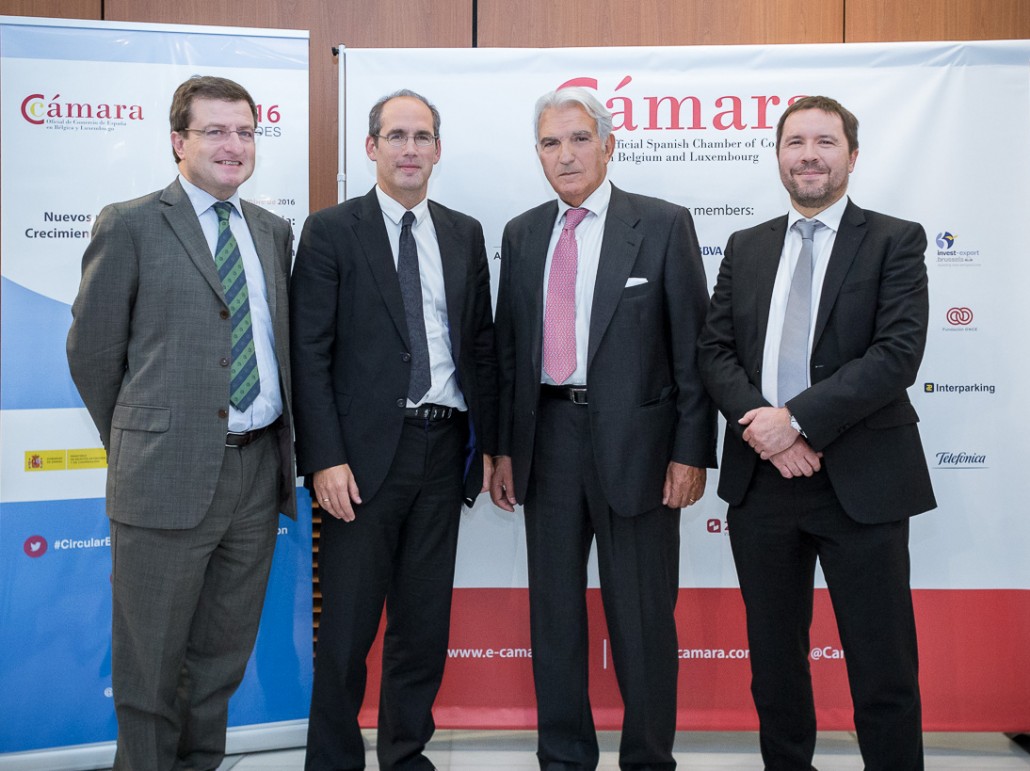
The President of the Chamber, Juan Rodríguez-Villa Matons with the moderator, Ignasi Guardans, and the rapporteurs Francisco Gaztelu and Alejandro Ulzurrun – Photography by: D. O.
In collaboration with:
 |
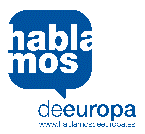 |
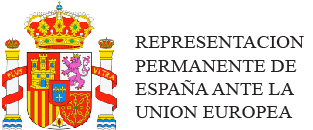 |
Have a look at the website of the event here.
Galery
[AFG_gallery id=’39’]
